 England's first World Cup match will be in Lens. William Hamilton looks at a small but proud town with a love for football
England's first World Cup match will be in Lens. William Hamilton looks at a small but proud town with a love for football
Brian Murphy must be one of the spawniest men alive. A folk singer from Stafford who toured the Irish and English pubs of Northern France, he became an ‘events consultant’, married a French woman and made his home in Lens, a small town in Northern France. As the only expat in town, Brian is something of a local celebrity. When we pop into some of the town’s many football bars, he is greeted with the affection and fuss normally reserved for populist politicians or local boys made good. Handshakes, smiles and free drinks abound.
Brian is in a mood to celebrate because today he received a letter in the post from a certain Michel Platini. Monsieur Platini would like Mr Murphy to be the events organiser for the World Cup in Lens. Hence the France 98 badge on his coat, the large grin and the gratis beer. The words feet, landed and on spring to mind.
Like many Englishmen who make their way in life in foreign lands, he is fiercely proud of his adopted home. But unlike most expats, he has good reason to be. Anyone who has the faintest understanding of what a real football town should be like will quickly discover that Lens is a paradise.
Brian is about the sixth person to point out to me that Le Stade Félix Bollaert, home to Racing Club de Lens and venue for England’s final group game, against Colombia, has a capacity bigger than the population of the town. Lens has a grand total of 900 hotel rooms, no public transport to speak of, no grand monuments and its football team has never won the French league, let alone European honours. Perhaps Brian Murphy isn’t the only person in town wondering how he is anything to do with the World Cup.
France’s tourist board are doing their best to flog the merits of all the host cities. The brochures point out the great monuments, famous art galleries and cultural and gastronomical attractions of France’s cities. But Lens has none of the above. Close to the Belgian border, you are more likely to find beer and chips than fine wine and nouvelle cuisine – the shops sell duffle coats not furs and the architecture is functional rather than renaissance.
Perhaps because of the town’s lack of glamour and lack of tourists there is an immeasurable sense of pride that the world will have its eyes on a town smaller than Doncaster. Unlike those in Paris or Lyon, the people of Lens can’t wait to see Jamaica or Yugoslavia fans wandering around the streets trying to find a croissant and a coffee.
Possibly it is those local people, with their friendly and relaxed approach to life and deep appreciation of football, who are the reason why the French football authorities chose unlikely Lens as a World Cup venue. Or perhaps it was the local mayor André Delelis, a prominent figure in the Socialist Party and one of the longest serving mayors in France who put the pressure on. Delelis is credited with saving the local club (and arguably the town) when his council stepped in to provide the necessary cash in the late sixties. Racing Club had always been the team of the mining community, but as the mines closed and unemployment rose there was no money left for football. The mayor and his council stepped in and brought the club back from the brink of extinction.
As well as ensuring that Lens have maintained a respectable presence in the top flight of French football, Delelis also brought the European Championships to Lens in 1984 after finding the money to upgrade the Bollaert to international standard.
But much as Delelis’ efforts are appreciated, ask a local and they will tell you that it was Platini who insisted that this unglamorous, former mining town be part of the biggest World Cup ever. Sure, the council in Strasbourg voted against hosting, OK we know that Lille’s stadium required a lot of work and that French politics demanded that the North have at least one venue out of the ten. But come on, it was Michel, the great footballing romantic who stamped his feet and fought for Lens. Platini, say the Lens fans, knows that the town has a passion for the game unmatched outside of Marseille. He knows that despite never having won a thing, the people of the town, and the region, keep on turning out to support their team – Le Sang et Or – The Blood and Golds.
He knows that Lens (unlike Marseille) have never had a hooligan problem, moreover they have a reputation for being the most sporting supporters in the country. So forget all those business centres and tourist destinations that happen to have first division teams, Lens epitimises the lost spirit of football.
And even if the Lensois are wrong, even if it was practicalities or politics that was behind the decision and not Platini’s philosophy, Brian Murphy and friends are right. In a game which has become obsessed with profits, corporate sponsorship and massaging its image, Lens is a taste of how football used to be and hopefully how it can continue to be.
From WSC 132 February 1998. What was happening this month
I missed this, but confirm the author's view that Lens is a great place to watch football and a very friendly town.